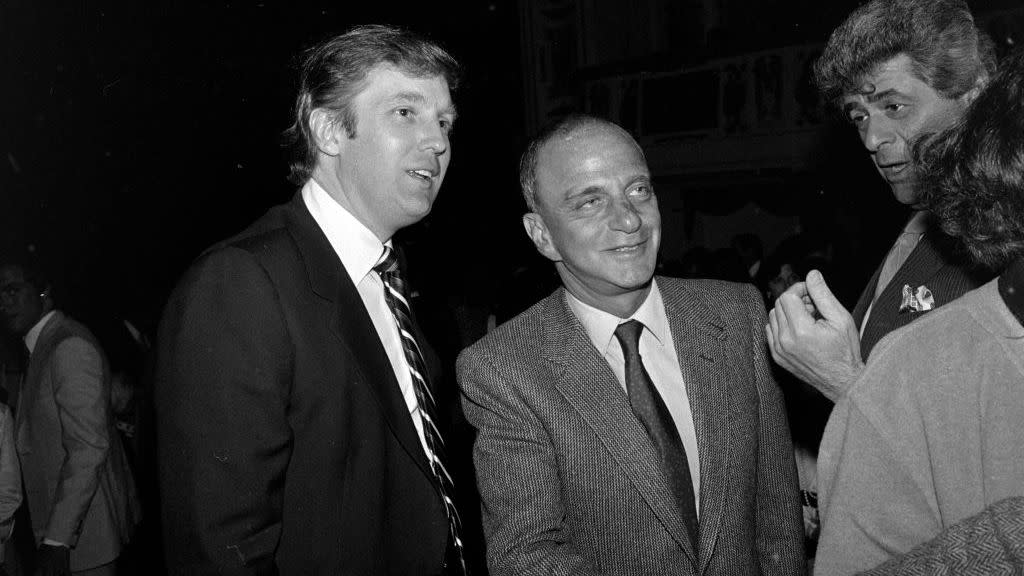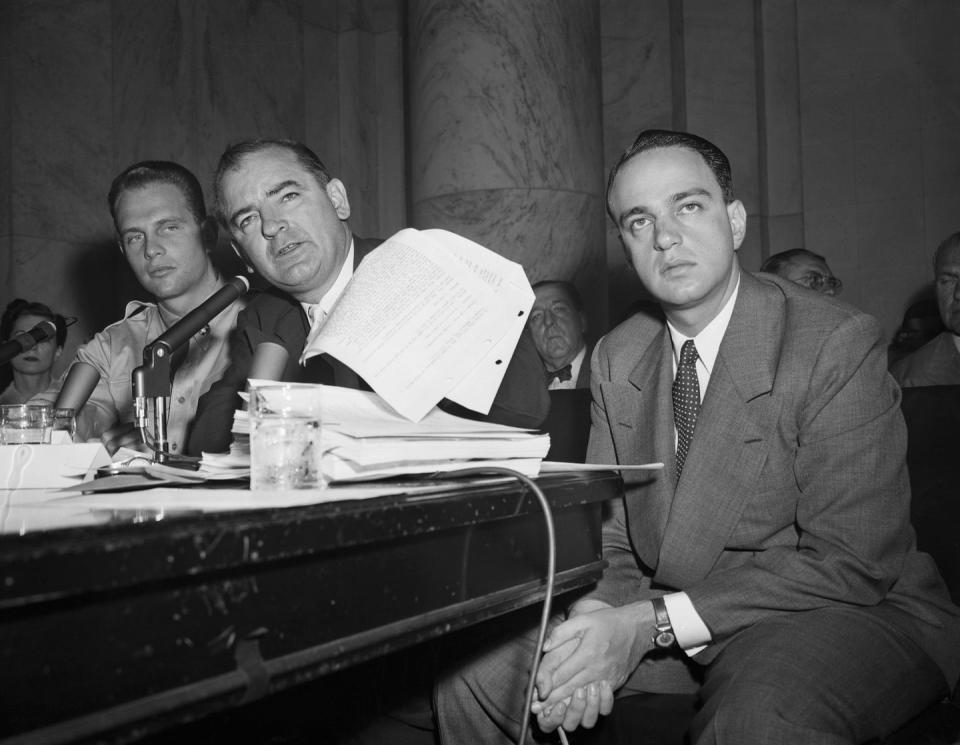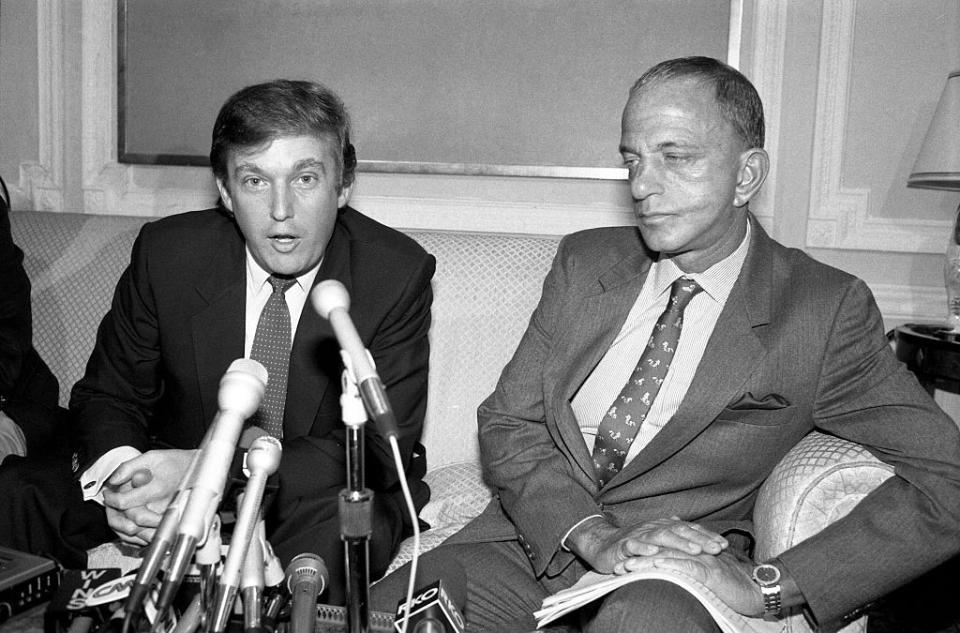‘The Apprentice’ Examines Roy Cohn’s Influential Friendship with Donald Trump

- Oops!Something went wrong.Please try again later.
- Oops!Something went wrong.Please try again later.
- Oops!Something went wrong.Please try again later.
"Hearst Magazines and Yahoo may earn commission or revenue on some items through these links."
Long before Donald Trump began his reality TV show The Apprentice in 2004, he was a budding business mogul who found his own mentor in unscrupulous New York lawyer Roy Cohn.
Their impactful relationship is the basis for a new biographical movie, also titled The Apprentice, which premiered at the Cannes Film Festival on Monday and is already brewing controversy. The movie examines young Trump’s rise as a real estate businessman in the 1970s and ’80s as well as Cohn’s documented guidance as his attorney and confidante.
Cohn, who died in August 1986 at age 59, greatly influenced Trump, now 77 years old, for decades to come—instilling a win-at-all-costs mentality that the business mogul has brought to politics and all the way to the White House as the 45th president of the United States. But his interactions with Trump were only one example of Cohn’s cunning and often controversial practices.
Cohn followed his father into the legal world
Born in the Bronx on February 20, 1927 to Albert and Doris Cohn, Roy grew up within the worlds of business and politics. His great-uncle Joshua Lionel Cowen founded the Lionel toy train company in 1900, while his father served as a Bronx county judge and later a State Supreme Court judge, according to Vanity Fair. In his memoir, Roy wrote that “virtually every heavy hitter in politics, law, [and] the judiciary made it to our apartment while I was growing up.”
But even by Cohn’s early childhood, his affluent family had already developed a flawed reputation. His maternal uncle Bernard Marcus served as the president of Bank of United States and was convicted of fraud after the bank failed during the Great Depression. He was imprisoned at the famous Sing Sing Correctional Facility 30 miles north of New York City, where Cohn regularly visited him during his incarceration.
Perhaps unsurprisingly, then, Cohn embarked on a law career himself. He graduated at age 20 from Columbia Law School and became an assistant U.S. attorney specializing in “subversive activities.” He soon become a noteworthy figure for his work during the Second Red Scare of the 1950s.
The lawyer led Senator McCarthy’s investigations subcommittee

Cohn’s first high-profile trial in 1951 was that of Julius and Ethel Rosenberg, an American couple accused of giving U.S. military secrets to the Soviet Union. The young prosecutor built his case around key testimony given by Ethel’s brother David Greenglass. According to Vanity Fair, Cohn wrote in his autobiography that he encouraged the judge in the case to order the execution of both Julius and Ethel, a significant breach of ethics. The couple were convicted of conspiracy to commit espionage—though Greenglass later admitted to lying under oath about the degree of his sister’s involvement—and executed by electric chair in 1953.
The case caught the attention of Senator Joseph McCarthy, who appointed Cohn as the chief counsel for his Senate Permanent Subcommittee on Investigations. The team became notorious for interrogations of alleged Communist Party members and LGBTQ individuals in the U.S. government. So prominent was Cohn’s role that singer Billy Joel later referenced him in his history-based 1989 song “We Didn’t Start the Fire.”
Cohn was known for his aggressive questioning; he “loved power, he loved pulling the levers of power, and he got a taste for that very early in his career,” according to his cousin Dave Marcus. The 2019 documentary Where’s My Roy Cohn? suggests part of Cohn’s ruthlessness on the committee may have stemmed from his own sexuality. Although he vehemently denied being gay, Cohn was known to have male partners throughout his life. According to another cousin, Anne Roiphe, “he would have done everything to hide it.”
Although the efforts of McCarthy and the committee were widely discredited, Cohn continued his career as a private practice lawyer in the mid-1950s to much success. His famous client base eventually included Donald Trump.
Cohn began working for Trump in 1973
Cohn represented a number of high-profile individuals and organizations, including New York Yankees owner George Steinbrenner and the nightclub Studio 54, and became known as an adept political fixer. Then in 1973, Trump sought Cohn’s legal help amid a federal lawsuit.
That year, the U.S. Justice Department sued Trump; his father, Fred Trump; and their company for alleged racial discrimination that occurred at their housing developments in New York City. According to Vanity Fair, the lawsuit charged that 39 Trump-owned properties implemented practices to avoid renting to Black tenants. These allegedly included marking applications with a “C” for “colored,” a violation of the Fair Housing Act.
Cohn began representing the Trumps and convinced them to countersue the Justice Department for defamation, seeking $100,000. “Tell them to go to hell and fight the thing in court and let them prove you discriminated,” he reportedly said.
The countersuit was more a stunt than anything and eventually thrown out, but it helped enable the Trumps to negotiate a settlement in the case out of court in 1975 without admitting guilt. It also marked the start of an extremely close relationship between Donald and Cohn.
Cohn considered Trump a “meteor rising”

Trump began to consult Cohn on a host of personal matters, with the pair at one point speaking as many as 15 to 20 times per day. Cohn advised Trump on real estate deals and his marriage to Ivana Trump in 1977, urging him to write a prenuptial agreement.
Elsewhere, Cohn introduced Trump to media magnate Rupert Murdoch, according to The Guardian, and helped ingratiate him with some of the city’s biggest power brokers through the lavish parties he hosted.
While their bond partially stemmed from their similar upbringings, it’s also clear Cohn identified Trump’s potential to become a global figure. “In one incredible piece of footage from the late ’70s, [Cohn] says that Trump’s a meteor rising from New York that’s going to go on to touch every part of the country and part of the world,” said Matt Tyrnauer, the director of Where’s My Roy Cohn?, in a June 2020 interview with Esquire. “That’s something said in 1978-79. It seems like Nostradamus in hindsight.”
Publicly, Trump has downplayed Cohn’s influence on his business and political accomplishments, telling The Washington Post in 2016 he was merely a lawyer. He also denied their relationship inspired his sometimes aggressive political rhetoric. “I don’t think I got that from Roy at all. I think I’ve had a natural instinct for that,” Trump said.
But from Cohn’s ability to cultivate relationships with the media to his attack-and-then-counterattack approach to dealing with adversaries, those who study the lawyer and Trump can’t help seeing the similarities. “I think that that’s actually understating it. I think Roy Cohn created a president from beyond the grave,” Tyrnauer said.
Cohn died after contracting AIDS
Seemingly untouchable at the height of his influence—Cohn was indicted three times on federal charges of bribery, perjury, and conspiracy dating back to 1963 and acquitted each time—the legal system and his failing physical health eventually led to his downfall.
In 1984, Cohn became ill and soon began treatment for what he claimed was liver cancer. In reality, he was suffering from complications of AIDS. Trump’s relationship with Cohn reportedly cooled for a time after this revelation.
In the meantime, Cohn was also at risk of losing his law license. A judicial disciplinary panel accused him of multiple violations, including falsifying the will of multimillionaire Lewis Rosenstiel in December 1975. The case drew attention for the notable character witnesses that appeared in support of Cohn during hearings in 1986, including TV journalist Barbara Walters and Trump.
Cohn’s legal team sought to have the case halted because of his “life-threatening disease,” but the Appellate Division of the State Supreme Court in Manhattan disbarred him on June 23, 1986.
Just weeks later on August 2, Cohn died of cardiac arrest. His death certificate listed dementia and “underlying HTLV-3 infections,” the original name for the HIV virus that causes AIDS, as contributing factors.
According to The New Yorker, notes left by Cohn’s longtime switchboard operator suggested Trump was the last person he spoke with prior to his death, though Cohn’s secretary has disputed this.
Trump paid tribute to Cohn in his 1987 book Trump: The Art of the Deal. “Tough as he was, Roy had a lot of friends, and I’m not embarrassed to say I was one,” he wrote. Almost four decades later, their friendship is now the subject of a big-screen adaptation.
The Apprentice brewed controversy at its Cannes premier
The Apprentice stars Jeremy Strong as Roy Cohn, Sebastian Stan as Donald Trump, Maria Bakalova as Ivana Trump, and Martin Donovan as Fred Trump. Strong, who portrayed Kendall Roy on the Emmy-winning HBO drama Succession, described Cohn as “the most fascinating person I’ve ever tried to inhabit.”
“His playbook has a tentacular reach that is staggering,” Strong, 45, told The New York Times Magazine. “I should say a disclaimer: My job is to be a humanistic investigator of a subject and to withhold judgment. So while I personally might have a lot of judgment about Roy Cohn, that is not the part of me that engages in the creative work.”
The movie’s world premiere at Cannes on Monday drew an eight-minute standing ovation and shocked audiences with more graphic scenes like Stan’s Trump getting liposuction and a depiction of Donald raping Ivana. In her 1989 divorce case deposition, the real-life Ivana had described a similar incident, though she walked back her statement in 1993 and 2015. The Apprentice includes a disclaimer that many of its events are fictionalized.
“We will be filing a lawsuit to address the blatantly false assertions,” said Steven Cheung, Trump’s 2024 presidential campaign communications director. “This garbage is pure fiction which sensationalizes lies that have been long debunked.”
According to The Hollywood Reporter, the movie will show in theaters throughout the United Kingdom and Ireland later this year. There is currently no distributor for a theatrical release in the United States.
You Might Also Like

